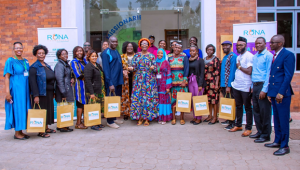Why Kenya Needs a Widows’ Commission and County Laws Against Harmful Widowhood Practices
A few weeks ago, Kenyans witnessed firsthand what harmful widowhood practices meted on women look like, when videos of Mellen Mogaka, a 31-year-old widow with two children was circulated on social media and news articles. Male members of her husband’s family dragged and whipped her and forced her to throw soil into her husband’s grave. Then they threw her in too, as some mourners accused her of causing his death. Some reports say she was locked overnight with his coffin.
Her story is not unusual. Every day, between three to five widows contact our orgnization, the Rona Foundation, through our network and paralegal officers, reporting cases of demeaning names, social isolation, humiliating rituals, by male relatives, such as brothers-in-law or uncles. Local elders or elderly women also endorse these harmful customs.
Even if we just look at videos like the one of Mogaka, there are others that demonstrate violence against widows, including one of Sylvia Atieno, a widow in Siaya. A male in-law demolished her house, and he refused a burial place for her youngest child. As alarming as these viral videos are, they do an important job of exposing the harsh realities faced by widows which are often unseen by those who haven’t experienced such loss.
There are over 8 million widows in Kenya as of 2018. That number is likely higher now due to the scant data collected after the COVID-19 pandemic. Indeed, any figure is just
an estimate as so many widows stuck in the depth and width of Kenyan’s 47 counties remain undocumented, unseen and unspoken – and blamed for their husband’s death.
Widows are also often harmed and hurt. Indeed, woe unto you if your husband dies in Kenya. Body autonomy becomes an abstract idea for theory driven movements, while widows continue to face helplessness and cultural oppression to degrees unimaginable.
In Siaya, where I was born, live, and work, widows like me are called ‘chi liel,’ meaning “wife of the grave,” a name that haunts us deeply. The culture mandates widow cleansing and wife inheritance (tero), rituals that are often celebrated with communal meals, despite the fact that many widows are coerced into participating in these deeply painful sexual rites. In Suba West, it is reported the local administration have established guidelines and committees to vet widow inheritors.
After I was widowed at 32 years old, I was shunned by close family, faced threats, intimidation, and sexual cleansing attempts, while struggling to keep my land and dignity, all without support. My now deceased mother, widowed herself ten years earlier, could not answer me when I asked her where I could run after enduring humiliating widowhood traditions. I observed her devotion to her children’s well-being, prayer and personal reflection, mostly in isolation. Her advice was to stay hopeful and persistent, even in uncertain times.
At first, I coped by seeking comfort in social events, then sought strength in prayer and learning about social justice. Today, I support widows by offering safe spaces and advocating for policies that protect them.
Despite the stories and data that I collect, critics say that widows are exaggerating, but the viral videos speak to what I have experienced and seen in my decade of widow work. They are clear proof of what widows’ face. The more visible the violations are, the harder it will be for people to ignore it.
Once we see a problem, we must act. It is time for Kenya to establish a National Widows Commission—an independent body under the Ministry of Gender or Parliament—to investigate and document the cultural, legal, and economic injustices widows face across all counties. This Commission would collect data, hear testimonies, and make binding policy recommendations, creating a national register of widowhood injustices. It should be publicly funded, with support from development partners and justice-led reparative schemes.
Further, all humiliating rituals meted on women affected by widowhood should be outlawed and criminalized. Already, some positive change is happening. The cabinet of Siaya County, led by Governor James Orengo, recently adopted the Siaya Widows’ Protection Bill 2024—a progressive step aimed at outlawing harmful widowhood practices and establishing systems that meet widows where they are.
Kenya is not alone in this fight. India has criminalized discriminatory widow rituals in several states and provides state pensions and housing support to widows. Nepal
outlawed widow-burning and forced isolation after public outcry and pressure from women’s rights movements. Rwanda reformed its succession and land laws to protect widows’ rights to property and inheritance post-genocide. Togo enacted laws that punish traditional cleansing rituals and enforced widow protections under its penal code.
These countries show that widowhood-related harm is not a cultural issue to be tolerated, but a human rights violation to be eradicated. Kenya must rise to this standard, nationally—beginning with the enactment of the Siaya Bill into law and replication across all 47 counties. If they don’t, widows will continue to suffer harm, indignities and poverty. We must end such inhumane practices now.
Roseline Orwa, a widow champion, and the Founder and Executive Director of the Rona Foundation, a Kenyan widow human rights organization. She tweets @roselineorwa


